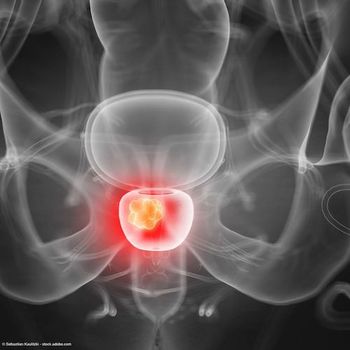
Treatment begins in trial of 64Cu SAR-bisPSMA in biochemically recurrent prostate cancer
The ongoing phase 1/2 COBRA trial is exploring the PSMA-PET imaging agent 64Cu SAR-bisPSMA in patients with biochemical recurrence of prostate cancer following definitive therapy.
The first patient has been successfully treated in the ongoing phase 1/2 COBRA trial exploring 64Cu SAR-bisPSMA in patients with biochemical recurrence (BCR) of prostate cancer following definitive therapy, according to Clarity Pharmaceuticals, the manufacturer of the novel PSMA-PET imaging agent.1
The multicenter, nonrandomized, single-arm trial (NCT05249127) is specifically enrolling patients with suspected recurrence of prostate cancer as determined by a rising prostate-specific antigen (PSA) following definitive therapy.2 Among patients who received radical prostatectomy, eligibility is defined as detectable or rising PSA ≥ 0.2 ng/mL with a confirmatory PSA ≥ 0.2 ng/mL. For patients who received radiation, cryotherapy, or brachytherapy, those eligible will have a PSA level elevated by ≥2 ng/mL above the nadir per the ASTRO Phoenix definition of biochemical failure.
The investigators have an enrollment target of 50 patients for the trial. The ability of 64Cu SAR-bisPSMA to detect prostate cancer recurrence, as well as its safety and tolerability, are the primary end points of the study. The estimated primary completion is April 2023.
"We are excited to have dosed the first participant in the COBRA trial at the Urology Cancer Center and GU Research Network (GURN) in Omaha, Nebraska, which continues to actively screen and recruit patients. We are very pleased to see our collaboration with Dr. Luke Nordquist at GURN grow and evolve as we fully explore the many clinical and logistical benefits of Targeted Copper Theranostics," Dr. Alan Taylor, executive chairman of Clarity, stated in a news release.
Other trials of 64Cu SAR-bisPSMA
There are several other ongoing trials exploring 64Cu SAR-bisPSMA, including the prospective, nonrandomized, single-arm, single-center, open-label phase 1/2 X-Calibur trial (NCT05286840),3 which is recruiting 150 patients with known or suspected prostate cancer. The primary outcome measure of the study is safety. Secondary outcome measures include disease status adjustment, disease staging adjustment, and clinical management plan prior to and following 64Cu SAR-bisPSMA PET/CT Imaging.
Additionally, the phase 1/2 SECURE trial (NCT04868604)4 is examining the novel PSMA theranostic 64/67Cu SAR-bisPSMA in patients with metastatic castration-resistant prostate cancer. The theranostic 64/67Cu SAR-bisPSMA combines 64Cu SAR-bisPSMA and the PSMA targeted therapy 67Cu SAR-bisPSMA.
In the open-label, single-arm, dose-escalation study, 64Cu SAR-bisPSMA will be used for the selection of appropriate patients to receive treatment with 67Cu SAR-bis-PSMA. The study aims to enroll 44 patients at multiple locations in the United States.
References
1. First patient treated in the US-based prostate cancer imaging trial of Cu-64 SAR-bisPSMA. Published online April 21, 2022. Accessed April 21, 2022. https://prn.to/3vzZqOh
2. NIH ClinicalTrials.gov. 64Cu-SAR-bisPSMA for Identification of Participants With Recurrence of Prostate Cancer (COBRA). Last updated February 23, 2022. Accessed April 1, 2022. https://clinicaltrials.gov/ct2/show/NCT05249127.
3. New clinical trial collaboration for Cu-64 SAR-bisPSMA in prostate cancer. Published online and accessed March 24, 2022. https://prn.to/382nxgw
4. NIH ClinicalTrials.gov. 64Cu-SAR-bisPSMA and 67Cu-SAR-bisPSMA for Identification and Treatment of PSMA-expressing Metastatic Castrate Resistant Prostate Cancer (SECURE). Last updated November 5, 2021. Accessed March 24, 2022. https://clinicaltrials.gov/ct2/show/NCT04868604
Newsletter
Stay current with the latest urology news and practice-changing insights — sign up now for the essential updates every urologist needs.






